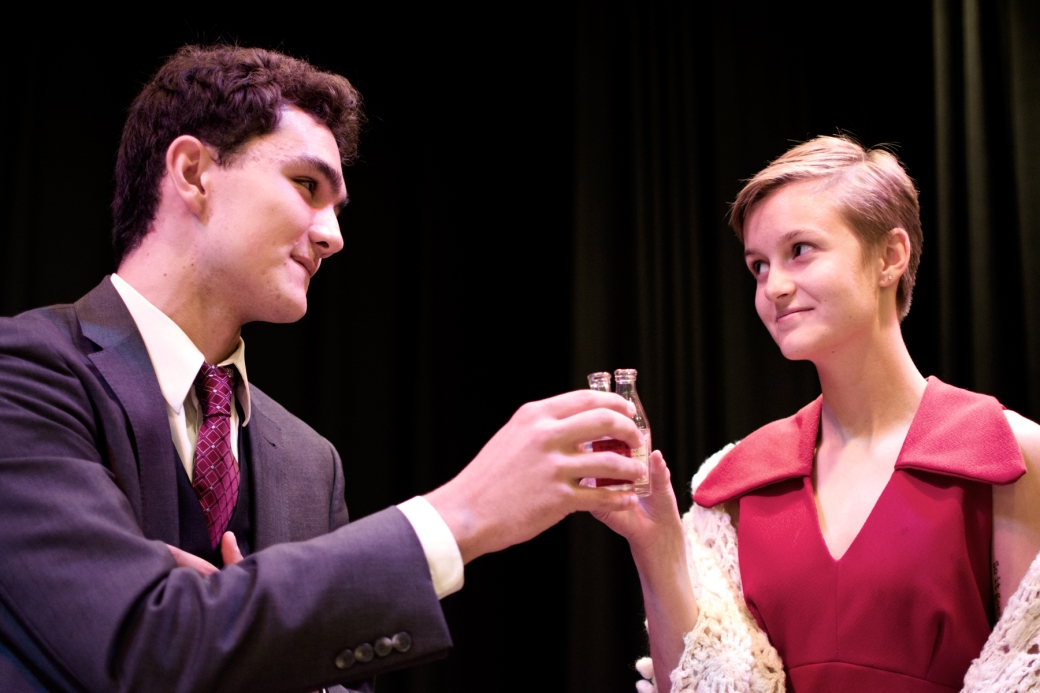At Convocation on September 22, we warmly welcomed 31 new students to Waring. What does it mean to be a part of Waring? Take a look at this year’s Convocation Speeches to learn what it means to members of Waring’s senior class, faculty, administration, and parents.
The full video of the event is also available here:
A welcome by Robine Vaneck, Associate Head of School
Good morning and welcome to the 2018 Convocation of the Waring School. It is wonderful to see so many familiar faces and also so many new faces gathered together here today.
A testament to the ownership that we all feel as members of the community is the number of people I see today who have been here in different roles over the years. I see Parents who have become Board Members; Alumni who are now Faculty; two Alumni Parents who are now Board Chairs Emeriti – Tom Burger and Dick Prouty – and one special pair of alumni parents turned Head of School and Department Chair, turned Faculty Emeriti – Peter and Allegra Smick. Welcome to all of you and thank you very much for being here today.
There are also many new faces here today who have come to join our community – the students are to my right and we’ll present them shortly. Your parents are no doubt sprinkled throughout. Faculty and staff are all here to my left, and in this group we have several new members who have all been introduced to you in various communications over the summer and even last spring and may already be known to you. But to help you put a face to a name, I will present them briefly now and ask them to stand and remain standing until I’ve welcomed them all.
Meg Ferguson Sauder, already a parent for four years and now also the school social worker; Kirsten Trumbull, our Learning skills coordinator; Julie Nelson, math teacher, coach and tutor; Harold Wingood, our new college counselor; Jill Sullivan, Alumna parent and now writing teacher; Anton Fleissner, math and also ancient languages elective teacher; Renée Becker, Immersion music teacher and Girls Chorus director; and Tim Te, science and math teacher and tutor, who was unfortunately not able to be here today. And since he joined us last spring and hasn’t had his official introduction to the community, I’m also going to ask Graham Pearsall – who does his work in the communications office, and is also running with the cross-country team – to stand and be recognized. Welcome to each of you!
Additionally I’d like to thank everyone who helped organize this day for us – Dianne, Pavel, and Rob for the tent and sound system, students for assembling and after this stacking the seats, parent Group Chairs Stephanie Patrick and Kelly Knowles, for organizing the decorations and assisting Wendy Panchy and the Group 4 parents with the luncheon that we are all invited to enjoy after this ceremony in the House.
Finally, although my role today is technically to open this ceremony and make some introductions, with The Waring School Ethic in mind, I’d like to take just a moment to share one very important idea about this school. It is not a new idea, but it struck me again on camping trip one morning, after breakfast, with a relatively trivial interaction.
Nearly all the students had finished breakfast and left to gather their things for the first activity period. A few students were at the far end of the dining hall wiping down tables, some were flipping the chairs up onto the tables, and some were pushing a broom around in a lazy pattern. A colleague and I were patrolling for last bits of breakfast remains and he picked up a mug with a little coffee in it and asked me, ‘is this yours?’ then looked in it, and said distractedly ‘or maybe it’s mine’ and then with finality and mostly to himself, ‘it doesn’t matter, it’s ours. It’s all ours.’
It’s probably going to sound a bit silly, but I thought that was beautiful. I thought it was beautiful in its simple encapsulation of our school community – because I don’t believe that he was only referring to the shared responsibility for a little mess left behind; I believe that he was really referring to everything.
This school is ours – yours and mine. We are each to varying degrees responsible for everything. All School Meeting is ours – we all sing happy birthday, respond to the speaker, lead a meeting. Science class is ours – we all share ideas, ask questions, challenge assertions. Chorus is ours – we all are attentive to our voices, sing with energy, know our parts. Soccer games are ours – we all support other players, compete honorably, cheer kindly. The Grande Salle is ours. The walkways are ours. The trash cans and recycling bins are ours. This event is ours – because without each of us owning a small part, there are no speeches, there is no music, there is no tent, there are no new students’ names in our inscription book and voices in our future! We must arrive here every day with the understanding that community is not a thing that we can hold or that can be given to you – but it is an ethos that takes form and that we share as long as our choices, words and actions sustain it. As long as we realize that it is all ours.
Thank you.

Elizabeth Gutterman
The Richard Prouty Award is given in recognition of a parent whose commitment and service to the community ensure a strong future for the Waring School. The award itself is relatively young, having been established in 2004. The award is younger still because it is one that we give intermittently, when we have occasion to look back at the preceding few years and take stock of those people and events that have had an impact on our community. Dick Prouty’s role as two-time Board Chair, long-time expert in experiential learning and leadership, and now as a Waring host parent truly embody spirit of this award.
Though this year’s recipient has joined the ranks of our alumni parents, her contributions and impact abide. I met Vicki Lincoln when I was directing my first play here at Waring, the Core production of The Wind in the Willows. We were on a dinner break, and I came into the VH room accompanied by her son, Mateo Lincoln who had written some beautiful and lively music for the production. He and I were in the midst of an incredibly high stakes situation room discussion that can only be had about the state of a middle school play. Vicki came right over to me, smiled her huge wonderful smile, and said, “You must be Elizabeth.” I put my hand out, and she waved it away, and enveloped me in the kind of hug that told me not only that everything would be all right on our riverbank, but also that I would find my second home here in the Waring community.
Vicki had made enough veggie chili with thoughtful accompaniments for an actual army – and in this case a forest full of starving preteen woodland creatures. Vicki visited with each participant, and made sure that each toad, rat, rabbit, mole, badger, otter, weasel, ferret, and fox was fueled and happy, and ready to return to rehearsal.
Vicki has fueled Waring in so many ways, by celebrating what is best about us, while always encouraging us to realize our full potential. As Parent Group Co-Chair from 2013-2015, Vicki organized, rallied, led, and inspired our community, sometimes through uncertain times. Vicki has been an eloquent spokesperson on Waring’s behalf and has enhanced the Admissions and College Counseling processes. As the Co-Founder of our Faculty Grants program, Vicki has worked tirelessly to ensure that Waring School faculty members will have the resources to challenge and enrich ourselves and to continually fuel our passions so that we may truly give our best to our students so we may guide them as they discover their own passions. We thank you, Vicki, for your generosity of spirit, your incredible kindness, your guidance, and your steadfast care. On behalf of Waring School, I am honored to present the Richard Prouty award to Alumni Parent and dear friend, Vicki Lincoln.

Edith Fouser
The first thing I want to say is “thank you.” I am grateful to be part of a community that loves me enough to send me away for a semester, a community that recognizes in this tangible way the value of being apart from the ordinary to refresh and restore. My family – my mother, my husband Jason, my children and my in-laws – appreciated those months of having me around to participate and to help out when they needed me. It was my privilege to use some time for professional development, at two outstanding math-teacher workshops.
Far and away, however, the exceptional opportunity of my sabbatical was an eight-week adventure in New Zealand. Jason and I traveled with our boys – Loben and Kepler – who are seven and five years old.
When I came back to Waring, people asked me, does it feel like you never left? No. I have new riches of experience.
We built faith that we can walk together through challenges and through our personal quirks and emerge into joy, wonder, and awe.
On the Abel Tasman Track, at the northeastern corner of the South Island, we embarked on one of many backpacking excursions. Road conditions had forced us to arrive at this remote trailhead only a half-hour before sunset. But the track across the headlands to our beach campsite was short – only three kilometers – so we adults shouldered the big packs, took our boys by the hands, and struck out. The moon rose in a sliver over a meadow scented with herbs as we crossed under a pinkening sky. After a long day in the car, the little boys were eager to move fast.
Once in among the palms and tree ferns, however, shadows grew deeper and even the clearings offered less light. I felt little Kepler grip my hand more tightly, and his questions grew increasingly anxious. I had just begun to hear the breakers and knew we weren’t far when he burst into tears. I tried all my soothing mama tricks but he wouldn’t have any of it. Around a corner I caught sight of tiny pricks of light beneath a rocky overhang about shoulder level. In that instant I remembered this marvel of New Zealand’s insect community: glow-worms.
“Kepler!” I said, stopping short.
Startled, he sniffled at me. “What.”
“Look,” I said, hoisting him up to my hip.
He recoiled, confused and scared, and buried his head in my shoulder.
“Glow-worms,” I said, beaming at him, “Tons of them! Look!”
I stepped us closer and he reluctantly turned to see. After a moment I heard a giggle. “Glow-worms?”
I could hear the surprise and delight in his voice as he wondered how a worm might make a light. Behind us I heard Jason and Loben approaching.
“Jason,” I said, and I knew he could hear me smiling, “glow-worms!” He drew Loben in and pointed up under the limestone.
We stopped for a long moment to admire this tiny constellation, twinkling like a second sky, and listened to the boys laugh in wonder, tears forgotten.
It was hard to leave that spot, but the sound of waves on the beachfront lured us forward to find our campsite on Anapai Bay. Familiar routines of setting up our tent and camp kitchen went quickly, and toasting quesadillas on the Whisperlite took only a few minutes. We sat in the warm night around a picnic table – actually a rare treat in the New Zealand camping world – and told our story back to each other before crawling into the tent for a long sleep.
Over and over on our adventure we experienced this pattern of pushing through into transcendence. The weather, someone’s mood, the terrain or some circumstance would drive us into frustration or worry, and we’d make that choice to stay in the work, to not give up for an easier, softer way, and then emerge into something worthwhile.
But haven’t we seen that together, Waring, in Endterm, in science class, as a community?
Math students – runners – writers – parents – I invite you to share in this practice as often as we wish.

Priscilla Malboeuf
It is a pleasure to see all of you but I will set expectations up front: public speaking is one of my least favorite things to do, right up there with a root canal. Nevertheless, I can’t think of any group I would rather address. So, here we go.
I am happy to add my voice to other’s in welcoming you to Waring. From my perspective, not only has this school provided a strong academic framework for my daughter Sarah, but more importantly it has been an extended family that she and I have needed and relied upon.
Our family lost my husband/Sarah’s father, when he died unexpectedly in 2013. That has taken its toll, but the Waring family has been there with us. At once being a shoulder to lean on and yet giving us the space to find our bearings; the Waring family has been there. We are a community, and what affects one affects us all. We rise together to face challenges, support and celebrate each other.
These are some of the many ways Waring distinguishes itself as place of learning. The faculty and staff are in this with the students, challenging each other to tease out the heart of their assignments. The students somehow innately know that no more is being asked or expected of them than what Waring asks and expects from itself. And therein lies the seeds of trust; the collaboration between school and student that over the years enables these kids to not just find their voices, but to trust their instincts.
But those attending classes are not the only students. During Sarah’s trip to Angers in 2016 there was a horrendous act of terrorism at the airport in Brussels. I was in email communication with Yasmin Fraser and realized then that Waring had been preparing me for a moment such as this. I thought, in our family, Sarah is not the only student of Waring – I am too. And as a student of Waring I needed to understand and trust that although we were in touch by Skype, Sarah and I were learning that she could manage this on her own.
How does Waring do it? Beginning with the Core trip to Montreal and the realization that there will be times when students are not in the company of an adult. They rise to that challenge, and we as parents, must too. And then watching them go through airport security as young 9th graders off to France for a month. And finally, Junior trip – the mother of all Endterms – France for three weeks. You wake up and the kid you have been dropping off at school (hopefully before 8) is packing her own suitcase, ticking off her own checklist, and making her own clothing choices (hard as that was to stand back from that) – all very matter-of-factly preparing for three weeks without you.
As parents Waring helps us to learn how to stand back, to let go, to let them carve their own paths and trust in our children’s judgment. When college comes we will be ready; confident that indeed they are well prepared for their future.
As I watch Sarah and her classmates take on their last year of high school, I know she is eager to embrace her future, as I am along with her – well mostly …. I still have a few more months of Waring to learn into that eventuality.
So welcome, families, to Waring. You’ve made a terrific choice of school for your children – and for yourselves.
Thank you.
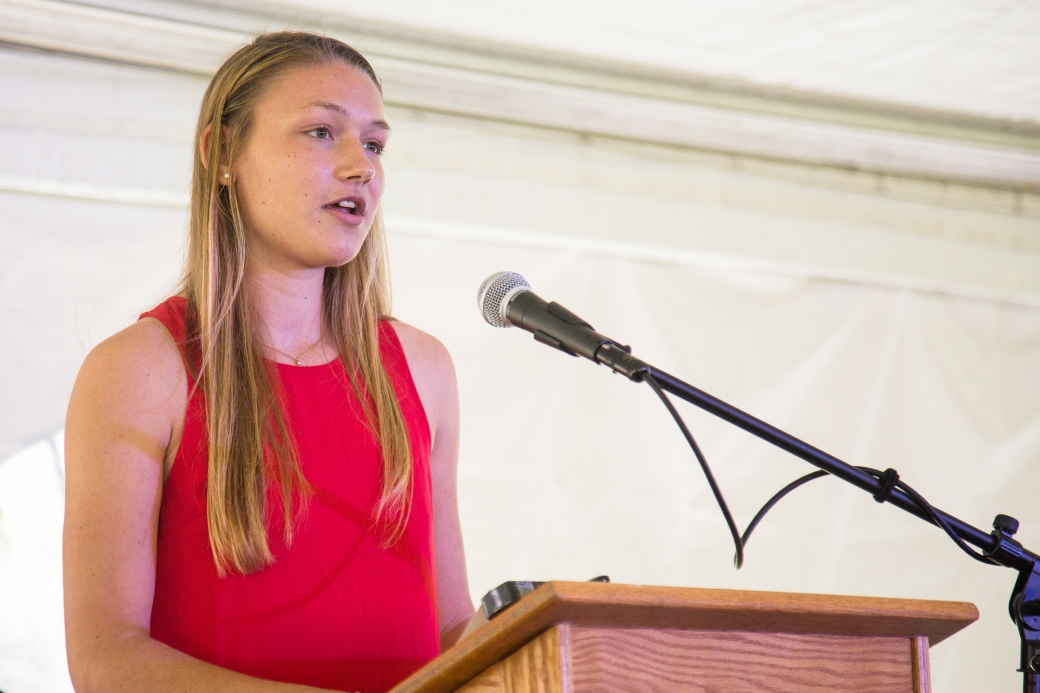
Julia Kautz
Imagine having an incurable disease for seven years. A time-consuming, chronic condition with daily treatments. Over time this disease challenges your pre-existing beliefs, thoughts, and outlook on life. Over 6 years ago I came to this school and contracted Waring-itis.
Within a week of my initial exposure, I began to see symptoms that would be reportable in any adolescent practice. I was suddenly motivated to make the most extravagant visuals for books like Donald Duck, and The Good Earth. I was restless, and I stayed up past the “core bedtime,” making a simulation of a rice field just for a Humanities discussion. Everyday I feverishly looked forward to French class in a basement where our young voices screeched “la vie en rose” for the entire campus to hear without yet knowing what we were saying.
It wasn’t long until I realized my disease was an epidemic. My entire grade had fallen ill with Waring-itis. Symptoms included breaking out in notecards; a rash of overwrought visual assignments, a persistent love for and desire to re-submit math problems for John Ferrick until we got them perfect, and an itchiness to run extra suicides at practice. The illness spread like fire on a dried up soccer field. By 8th grade my case had worsened, I was delirious to do everything on campus, and my peers were no different. I was in Debate Club, Math Team, Orchestra, Ensembles, a Play, and three sports. Despite this affliction, my classmates and I quickly mastered how to manage time and priorities. I learned how to question and participate in discussions and to advocate for my own education. We began to link ideas across disciplines.
I knew it was serious when I left for France as a high school freshman, spending an entire month in a country across the sea, living with a family of strangers who didn’t speak English. But we weren’t nervous, just excited. In Angers, I ended up flying in a plane smaller than our family car at 20,000 feet with my host father as the pilot.
Waring-itis was making us strangely comfortable taking risks. Every soiree infused me with a need to be better. My trembling 11-year-old arms that used to add unwanted vibrato to the violin became more and more confident as the number of performances multiplied. Coffee houses and dance planning masked the grade-bonding developing underneath. Endterms with 12-hour bus rides to Baltimore, dancing with the Bolivian soccer team at Copa America, and putting on a Vaudeville show in nursing homes all tested our character and charisma.
Junior year we went eagerly to Francis’ Physics class. In Humanities Joshua’s “You don’t know, what you know, you don’t know, you know” slowly made sense to us, very little sense, but still some. Topics from Debate metastasized into every class like a tumor. Tim Averill’s Lit class transfigured into Life Advice Class.
By the time we became upperclassman everyone had an irrational desire to be a Teaching Assistant in some subject at Waring. That’s when Waring-itis was full blown! It really was viral. Why did I love these people and this place so much? The daily conversations with Dianne and Pavel; the smiles from Mrs. Cahill as I rushed to class at 7:59; tutors like Mike and Colleen who cared more about my overall health than I did. It is all so contagious.
To those of you about to be infected: embrace Waring-itis through contact with the Waring community. It is everywhere. Vectors include your teachers, coaches, administrative staff, and classmates. Trust me, this is one disease I hope they never find a cure for.
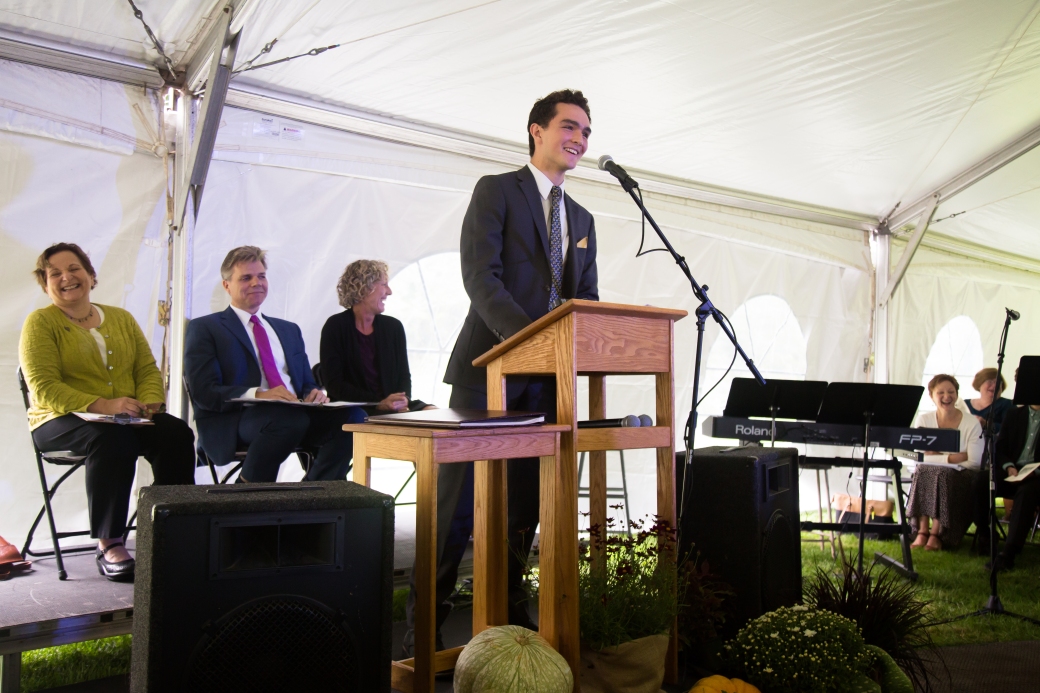
Gareth Buhl
When I was just beginning here in the eighth grade, awkward, clumsy, and a bit too tall (a lot like today), the faces around me seemed immortal. I struggled to fill in the blanks about this strange new place, and I wrote what I saw in stone. Henry Mitchell is a senior. My sister Autumn is a Sophomore. Graham teaches math. Mel is the head of school, Inga works in the office with Mrs. Cahill, and of course our darling Dorothy Wang will always be there to give me a hug and a kind word when I need it. Those of you new to Waring won’t recognize these people and perhaps you’ve never even heard their names. But in eighth grade they were the only Waring I knew.
When I came back as a ninth grader, I looked around and was shook. The school was mostly the same but it felt like everything was different: Mel, Inca, Dorothy, and Henry were all gone, and now there were new kids who were even newer than me. And the same thing the next year: Andrew, Jack, and Graham were all leaving and I knew that soon I would be helping pack my sister’s room to send her off to Kalamazoo as even more unfamiliar faces filled the Waring campus. What happened to the school I used to know?
I don’t think I’ve attended the same school two years in a row. Our culture has been shaped by the beautiful, critical voices who have passed through here. New students, parents, and teachers come in with their own insights. As they spend time here those insights illuminate our shortcomings. If we can listen to those critical voices among us, we can be better. We have listened to students like Asher Leahy who started Waring’s queer club because he knew that inclusion takes more effort than tolerance. We have listened to students like Julia Natale who campaigned for equal recognition of women’s sports. We have listened to students like Laura Miller, Lily Wildrick, Elizabeth Ward, and the countless others who fought to open a dialogue about gender and sexism in the Waring community. These students are no longer here, but their legacies live on to remind us that this is a brand new year, and we do not have to accept the world as we see it.
This year I knew what to expect, and while I was saddened watching old friends and teachers leave this little commune, I was excited to see the fresh and young, well mostly young faces that have joined us. New students: perhaps you see Waring now the way I saw it in eighth grade. Tim is the head of school, Mrs. Cahill runs the front desk, and this small class of 23, myself included, are the seniors. As we leave we pass this school down to you, a fair share for all. Do what you can with it. This place will be changed by you if you let it. Do not accept this school as it is, but make it accept you as you are. The Waring we leave to you does not have to be the Waring you give the next generation. Make us smarter, make us fairer, and above all, make us kinder.

Phoebe DeAngelo
For months now, I have had my graduation speech completely planned in my head. That being said, I am not funny so the four jokes that I do have will all be included in that speech. Sorry.
I thought that maybe I could talk to you all about my first camping trip but then decided that no one would be interested in hearing about how hard I tried to fit in before I realized that fitting in, is totally uncool and completely Un-Waring. My next thought was to talk about how on my tour, I walked into a senior math class and one student was solving an equation on another student’s leg, but then I realized, that is the whole story. After thinking through a couple more ideas (both cliché and not good for some of the audience), I decided I am going to talk to you about math.
Contrary to popular belief, I think math is super cool. I am the kind of girl that solved a polynomial division problem on the back of one of those paper menus you get at a Chinese restaurant with the animal signs on them, solely because my dad didn’t think that the problem could take up the entire page. I was right, and so was the math problem.
Growing up, liking math was the worst thing that you could ever admit to. So, as any middle school girl would, I played along. “Ya, I know right, that class was the worst. Who cares about numbers and letters and the way numbers and letters come together to equal more numbers and letters? It totally isn’t interesting at all and I totally am not going to do the bonus questions he gave us if we wanted more problems to do tonight.” I used to lower my test scores by at least 10 points when people asked me what I got so that I could avoid the embarrassment of actually doing well in school. Long story short, my whole charade was revealed when my math teacher told the class that I had the highest test average. I was done for.
So, I ran away to a tiny school in Beverly that I had never heard of and as it turned out, they actually liked math. And not only did the students there like math, they liked learning, and the teachers were happy to teach the students and the students even taught the teachers a lot of the time. I fell in love with school again and not only was it okay, it was encouraged. Let yourself be the person that wants to do the bonus homework questions, even though you have three other subjects to do. Let yourself push through your fears. That is what I am showing you today. I am standing up here, giving a speech, when I have been too afraid to even speak at All School Meeting for my entire Waring career. It could take time (approximately three years and 9 school days, if you’re like me) or it could be your first period on Monday morning. Waring is not about changing who you are but, about uncovering who you can be.

Sasha Malley
You don’t know you’re a Waring Student yet.
You’re at Waring because your brothers came here. You’ve come because your family speaks French. You’re here because you love to read. You want to be challenged, and you like to take risks.
You don’t know you’re a writer yet.
You’ve come to Waring full of ideas and aspirations, even if you can’t articulate them yet. Maybe you sit in this tent and wonder if you will measure up. You wonder if you will be able to explain what drives you, what inspires you and what is worth fighting for. Do you have the words? Have they all been used up already?
You don’t know you’re an artist yet.
Drawing pencils don’t fit comfortably in your hand. You drew your very first vase in the middle of the page despite KB’s instructions. But within the palimpsest of your first, second, hundredth attempt, you have created something worth talking about.
You don’t know you’re a scientist yet.
You’ve never taken so many notes in your life but now you’re driving home anxious and excited to start your first problem set. You begin to ask questions during your first lab, and you don’t know it yet, but that’s the beginning of a hypothesis and the beginning of a scientist.
You don’t know you’re an athlete yet.
Your basketball sneakers are giving you blisters and you still don’t quite understand the rules of the game. But here you are, on the court with your teammate as she sinks six three pointers, and the balcony of spectators is going wild and the whole gym starts to shake for your team.
You don’t know you’re a francophile yet.
Your notebooks are littered with verb conjugations that you think you’ll never remember, and you’re worried you’ll never do justice to Christiane’s name. But you find yourself humming Papaoutai while helping your 22 best friends scale the French mountainside, toute en rêvant de ta prochaine baguette.
You don’t know you’re a teacher yet.
But now you’re shepherding Group 1 writers around the school and they’re arguing about who gets to read first, and once they quiet down, they look to you. Or maybe you finally step up in Humanities and read a bit of your marginalia, and Jim starts to smack your classmates’ notebooks so that they write down what you said.
You don’t know you’re a feminist yet. And you never thought you’d be a debater.
But maybe you’re starting to enjoy the sound of your voice when you make a point. You’re starting to work harder just to see that look on that face when you convince an audience.
Right now, I want you to know one thing: When you hear the bell that symbolizes your entry to Waring, you become part of a community that believes in you and believes in your ability to become all things. Here is a space where you can pursue your passion, develop your identity, and grow your voice. These bells call to you. Listen. You don’t know yet where you will go. But it will be a journey worth taking.
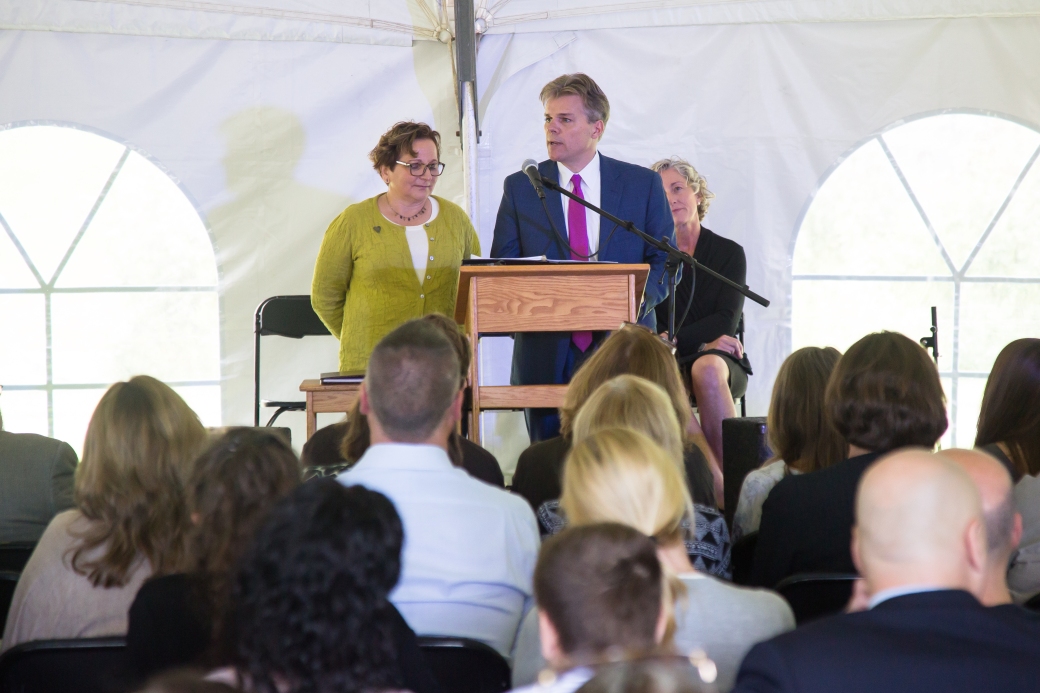
Tim Bakland and Joanne Avallon: A Momentous Announcement
TB:
At Waring, we ask questions. Why learn? What is the best way to learn? How can we learn from each other? How can we use our imagination and passion to make the learning experience exciting and joyful?
JA:
At Waring, we learn for learning’s sake. Curriculum and content are only a means to a larger end. We learn how to learn, how to lead with open hearts and minds and integrity, we gain the skills and competencies to thrive and empathize in a diverse, changing world.
TB:
At Waring, Faculty drive our culture and our mission. Our teachers live out passions tthrough a life calling, a vocation. Superbly qualified, our teachers are able to mix spontaneity with experience and expertise. They utilize experiential and progressive pedagogies in their teaching and, in fact, like our students, Waring teachers are always learning.
JA:
At Waring, diverse ideas spring from a diverse community. Those who are passionate about learning, those who take personal responsibility for their growth, those who have the courage and aptitude for the rigors of Waring’s program – come from all walks of life. Waring devotes significant resources to ensure that our student population is diverse in all respects.
TB:
Waring’s campus is community-oriented. This beautiful, quirky, rustic estate, filled with pianos and renovated stables, facilitates learning in relationships. Anywhere, everywhere we see learning in circles, and mixed-age participation, from the smallest alcoves of a building, to our large, open spaces and All-School Meeting venue. Waring’s campus is an organic, living and breathing entity. Individuals, like living cells, comprise a larger, dynamic body of learning and being.
JA:
In 2015, Waring’s Trustees and Faculty published a 5-year strategic plan,committing ourselves to supporting diversity and affordability through financial aid, to bolstering the supports of our teachers and staff, and to moving forward with a comprehensive Campus Masterplan. We raised over $500,000 in two years with a Major Gift Initiative, and then were granted a subsequent $75,000 of permanently endowed funds from grateful parents of students and alumni which now facilitates a Faculty Grants Program in perpetuity. We have had fiscal strength and successful supports for Annual Fund raising, thanks to the generosity of our community. And, if an Annual Fund is an indicator for the health of an organization: just consider that we have had 100% Board and Faculty participation annually for several years now.
TB:
Today, we are positioned to make a transformative announcement that marks a historic moment for the school. With the momentum of our strategic plan, and the ensuing Major Gifts Initiative, we have enjoyed widespread community support of Waring, its direction and its strategic initiatives. Money raised for faculty and students is already in use, already part of the operating budget, already reflected in new teaching positions, professional development, and in financial aid and student supports. We have targeted the first and greatest capital need in our Campus Masterplan, and the designs for an entirely new and sustainable All School Meeting space are well underway with our architects.
JA:
We therefore officially announce to you today our CAMPAIGN FOR WARING — with the goal to raise an historic $6 million dollars for our students, faculty and new School Building.
TB:
To date, through the record-breaking support of donors from all constituencies as well as from foundation support of Waring’s mission, we are excited to announce that we have already raised a remarkable $5.1 million in commitments toward our campaign goal! This $5.1M has been contributed from 28 donors during the “quiet” / nucleus fund of this Campaign, which we began in January.
JA:
We are thrilled at the momentum and I am grateful to the entire Board of Trustees, 100% of whom have given to this Campaign already. Through this campaign, in addition to the school building, we continue to raise meaningful funds that support faculty and students, to the tune of $200K each year, in addition to the Annual Fund’s support of school’s operations.
TB:
Through this campaign, we will see through the final design and construction of a new school building built to Passive House Sustainability standards — a first for schools in our region — a home for learning with nooks, porches, classrooms …. And CUBBIES… that will merge with and embrace the natural beauty of our campus; a building that will have intimate spaces for quiet discussion; a new All School Meeting space that will appropriately and comfortably bring the entire school together for our gatherings, a critical shared experience that dates back to the “morning meetings” with Philip and Josée in Rockport, MA. This new building will serve as a catalyst to learning, and will allow Waring to continue to invite, engage and connect, inwardly and outwardly symbolizing the very soul of Waring School.
JA: We call on our entire community to help us as we move forward with these momentous plans.
TB: We call on you to continue imagining this Waring School together and to be a part of this remarkable period in Waring School’s history. Thank you, all, and stay tuned.

Tim Bakland
Contained within Grace Lin’s When the Sea Turned to Silver, Waring’s summer reading, there is a wonderful short story entitled The Story of The Ginseng Boy.
In this adventure, a young girl is sent away from a happy village life with good parents, lakes, fish and sun, to a shadowy forest with gray rock, where she is to live with her elderly aunt and uncle. Over time this old couple, who seem resigned to lead a dull and unhappy existence, take notice that the young girl is leaving the cottage with more frequency and can even be heard laughing and playing off in the distance. Incredulous that the young niece could find happiness or companionship in such joyless environs, the old couple question her about her solitary amusement.
“Well… I don’t play alone,” says the young girl, “I have a friend. A boy. A boy in a red hat.”
The unhappy old couple come to understand that their niece’s companion is the The Ginseng Boy — a mysterious being dressed in red who, each month during the Night of the Red Moon, turns into a root.
Well, the unhappy old couple decide they must procure this Ginseng Boy and eventually execute a plan, hunting him down while he is in his root form. Bringing him back to their cottage, the old couple place the Ginseng Boy in a large pot, where they bring him to a boil, with the ultimate plan… to eat him up. Why, after all, if they manage to consume this magic root, of course, they’ll be nourished with the vigors of youth.
Like the soup over their fire, the couple’s scheme thickens, with the aunt and the uncle each devising a way to get the other out of the house so that each could, secretly, consume the full share of the root, taking for her and himself all the more of the youthful sustenance.
As you can imagine, though, the couple’s plans are predictably thwarted when each of them in turn greedily attempts to double-cross the other; and in a rather comical twist of events, they trip over their own scheme, even injuring each other in their ill-founded plan, all the while our Ginseng Boy (now returned to his child form) and our young girl eventually escape from the cottage, leaving the old, injured adults behind, our young companions running “far, far away, never to be heard from again.”
Nieces, nephews, Ginseng Boys and Ginseng Girls, meanderers far and wide: Welcome to Waring.
Welcome to a place of curious spirit, youth and laughter, meanderers and dreamers. Waring may not, technically speaking, have lakes or many fish, but there is something of a pond, and certainly a stream, and even more certainly… floods, and you’ll surely find in exploring this land and these old barnyards, stables and greenhouses, much more than meets the eye.
Welcome to a place where many of the inherent lessons in that Ginseng Boy story are lived out when we are at our best; welcome to a community that values agency and authorship of the individual– most of all, in our students; a place where we count on you along with our faculty, to drive our school, to define a culture, to dream up both the broadest notions, and the daily details. You will undoubtedly find in us elder folk that we may embody, from time to time, some of the unfavorable traits of the aunt and the uncle in our story. There will be times when we adults will, at worst, trip over our own ill-advised schemes, or, at best, be reminded by your voices and actions and natural propensities, that there is everywhere the self-propelled will of the student, the natural curiosity and agency in each of you. The Ginseng Boy reminds us all to loosen our grips, to relinquish some of our control, and to let loose the marvelous dance of youth and learning.
Speaking of elders–and I realize that I am getting older as I even ponder doing the following: I would like to leave you off with a brief story of time spent with my maternal grandfather–who, old as he was, never resembled the aunt and uncle in our story, and who brings a lesson that I think connects with our Ginseng story and with the spirit of Waring School.
My late grandfather, Erlon Blood, would be 100 years old this fall. He grew up in rural Andover, ME during the depression, cross-country skiing his way to school in the winter months like anyone else at that time from his neck of the woods. During WWII, Grandpa Erlon trained and served as a ski medic in the 10th Mountain Division of the war, and was stationed in the northern Italian alps — where I can only begin to imagine the scenes and stories.
Many of those 10th Mountain Division ski soldiers actually returned to start the nordic and downhill ski centers we know today. Although not such an entrepreneur, my grandfather returned from the war a life-long nordic skier, even a medalist in the Lake Placid Masters at one point, and passed down to the family, over many winters, a lifetime love for the serene, backcountry woods, and the exhilarating pastime of nordic, cross-country skiing.
My wife Andrea and I were fortunate enough to have some precious overlapping years of cross-country skiing with Grandpa in Bethel, ME. Even though he was by then in his late 80’s, Grandpa Erlon taught us the intricacies of freestyle “skate-skiing”, including the precise technique to skate up steep hills without stepping or herring-boning (as it’s called), and the art of meticulously waxing skis.
What remains with me more than anything else from those winter lessons with Grandpa Erlon, is his careful description of a particular state of physical and mental being, a state achieved in the rarest moments when one’s intense, most heightened efforts will–almost without notice–transform into an effortlessness, a suspension of all calculation, all detail. Grandpa called this rare moment: abandon, when the skier is in such a state of perfect, synchronous strides, that the little details vanish from the mind, each movement becoming part of a subconscious whole, each glide an instinctual response to its antecedent gesture. This is what distance runners experience at mile 10, or 11, or 24, when an initial preoccupation with each and every stride is gradually replaced by the indescribable feeling of wind on the face. It is the pianist whose fingers no longer matter to the mind, the debater whose detailed preparation transforms into instinctive rebuttals, the teacher whose class notes lie on the table unseen while students lose themselves in a discussion of The Odyssey or Euclid’s proof of the Pythagorean Theorem. The paradox inherent in this state of abandon is that while it can only achieved through much practice, skill and intense effort, it is also, by definition: effortless, unplanned, unordered, completely unencumbered by any constraint.
Like our young niece and her Ginseng Boy companion — youthful souls liberated from controls and confinements, we are all called together today — poets, scientists, artists, and nordic skiers of all ages — to join our newest Waring students, in the joy and the abandon of learning.






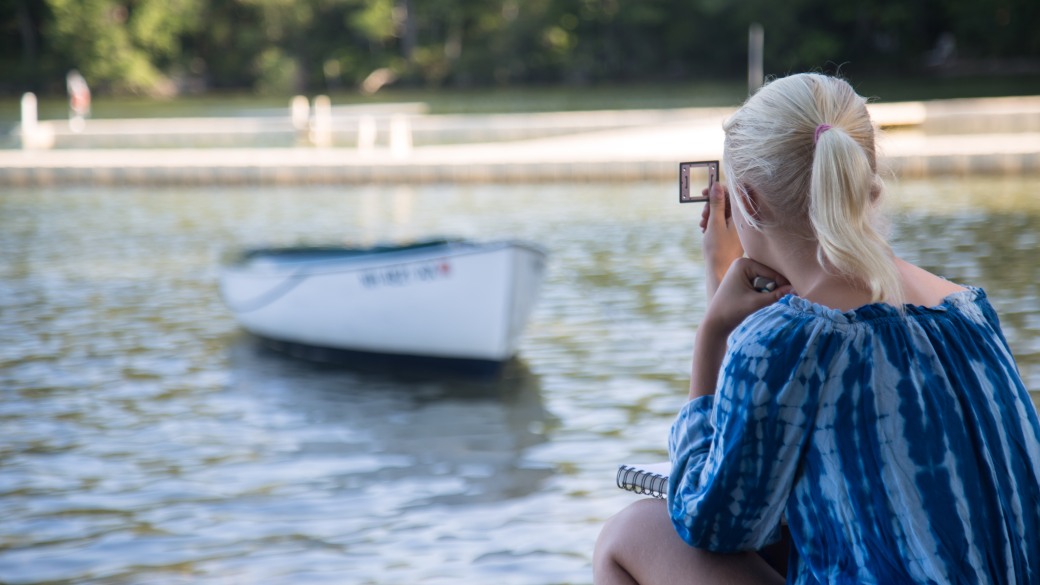

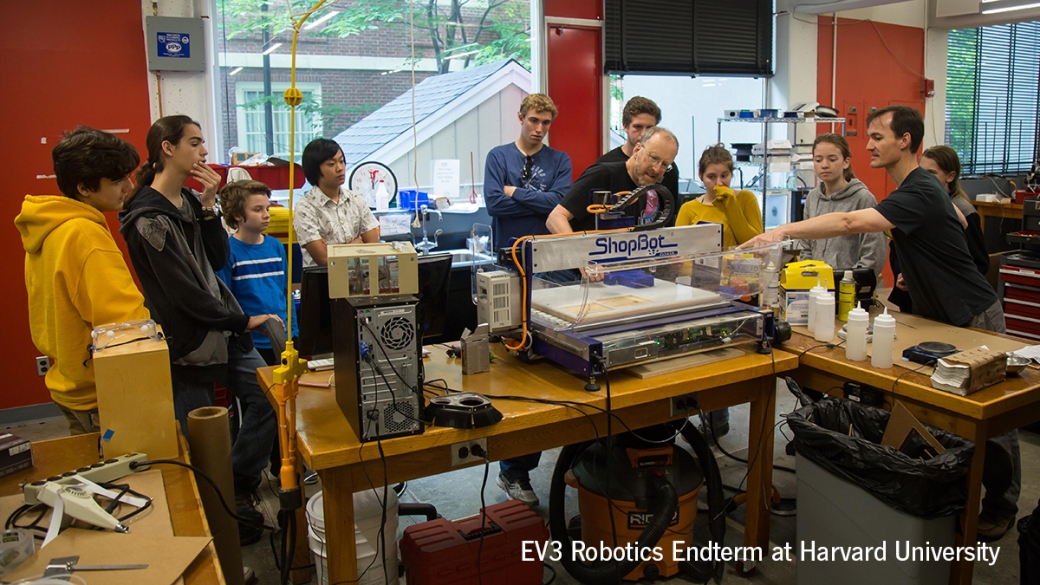
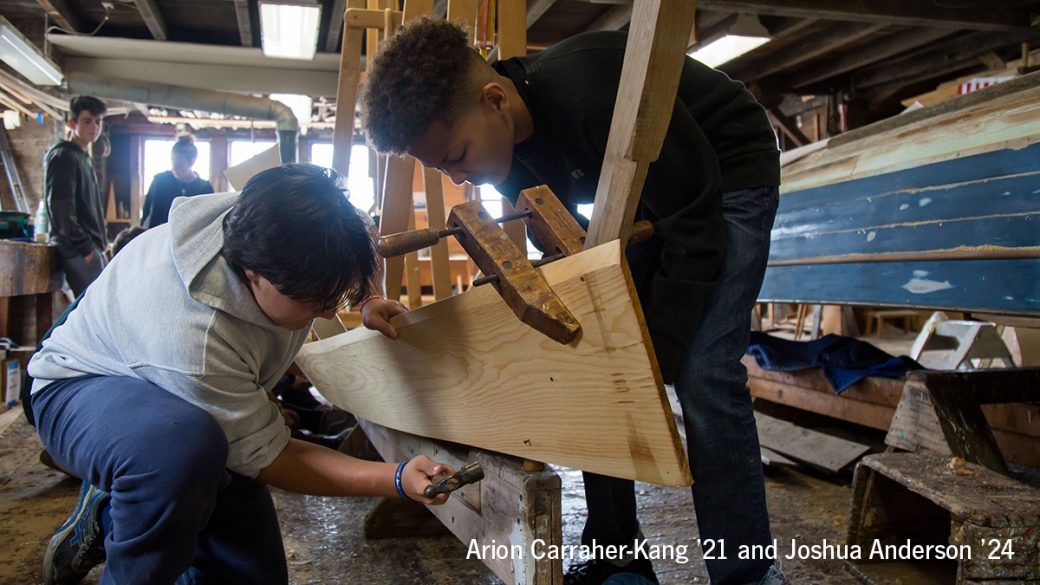
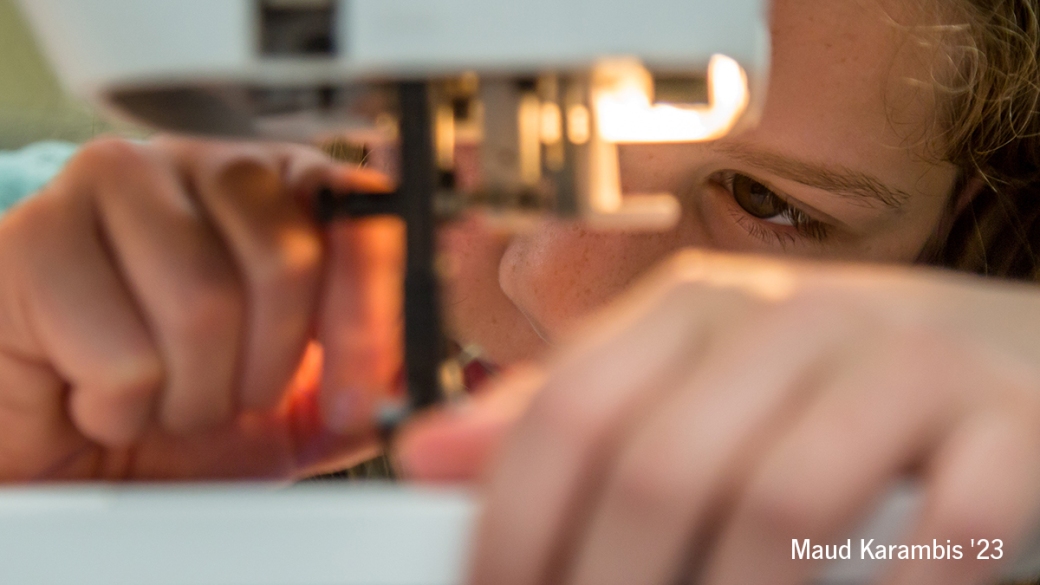


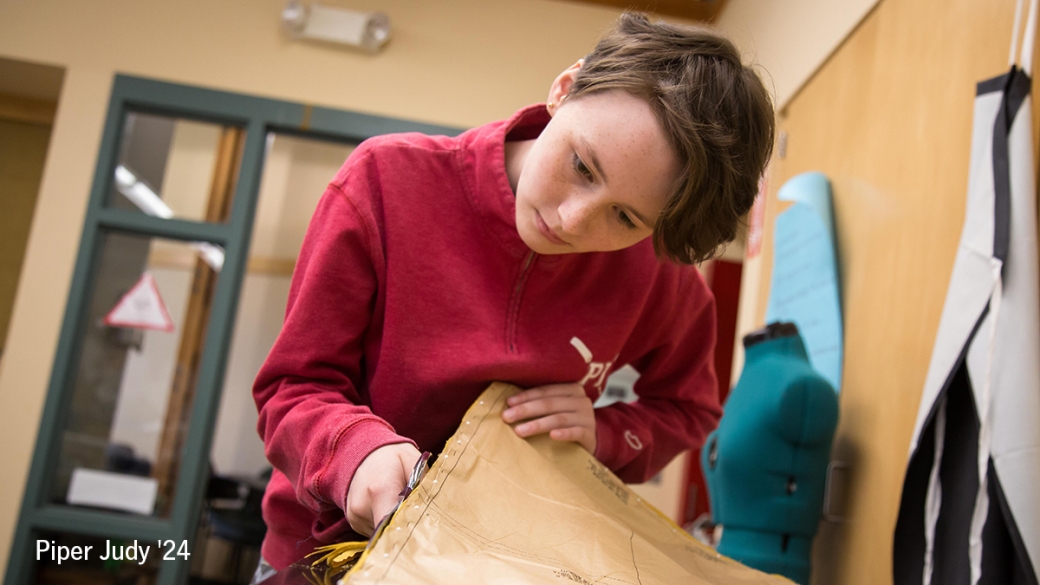




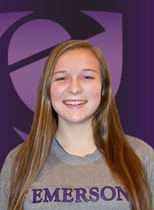 I caught up recently with Waring alumna, and former two-sport athlete at Emerson College, Maggie Sheetz. Although Maggie has graduated from
I caught up recently with Waring alumna, and former two-sport athlete at Emerson College, Maggie Sheetz. Although Maggie has graduated from  Waring alumnus Nick Wigglesworth is a Sophomore at Hobart College where his team made it to the final eight of the National Collegiate Athletic Association tournament for Division three soccer this past season. It is the second time in as many seasons that Wigglesworth has been to the final eight, only not with the same team.
Waring alumnus Nick Wigglesworth is a Sophomore at Hobart College where his team made it to the final eight of the National Collegiate Athletic Association tournament for Division three soccer this past season. It is the second time in as many seasons that Wigglesworth has been to the final eight, only not with the same team. 
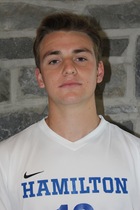 Waring alumnus and former Boston Globe All-Scholastic Aidan Wood is not only considered one of the best players in the most competitive division three soccer conferences in the country, the data actually proves it. Aidan led the NESCAC in total points and was tied for top goal scorer in the league with eight goals, three of which were game winners. He was voted
Waring alumnus and former Boston Globe All-Scholastic Aidan Wood is not only considered one of the best players in the most competitive division three soccer conferences in the country, the data actually proves it. Aidan led the NESCAC in total points and was tied for top goal scorer in the league with eight goals, three of which were game winners. He was voted 
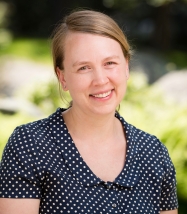 Making and doing has been an integral part of Waring’s approach from the early days of the school when a student’s day might include taking care of the goats, woodworking, baking or typesetting, as well as academic work. The opening of the Waring Industrial Park (WIP) this fall is a natural extension of this original vision of experiential, creative learning and gives students space and tools to work on their own projects, as well as the opportunity to participate in new initiatives such as First Lego League.
Making and doing has been an integral part of Waring’s approach from the early days of the school when a student’s day might include taking care of the goats, woodworking, baking or typesetting, as well as academic work. The opening of the Waring Industrial Park (WIP) this fall is a natural extension of this original vision of experiential, creative learning and gives students space and tools to work on their own projects, as well as the opportunity to participate in new initiatives such as First Lego League.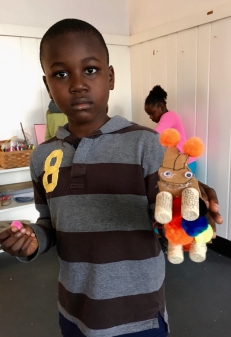
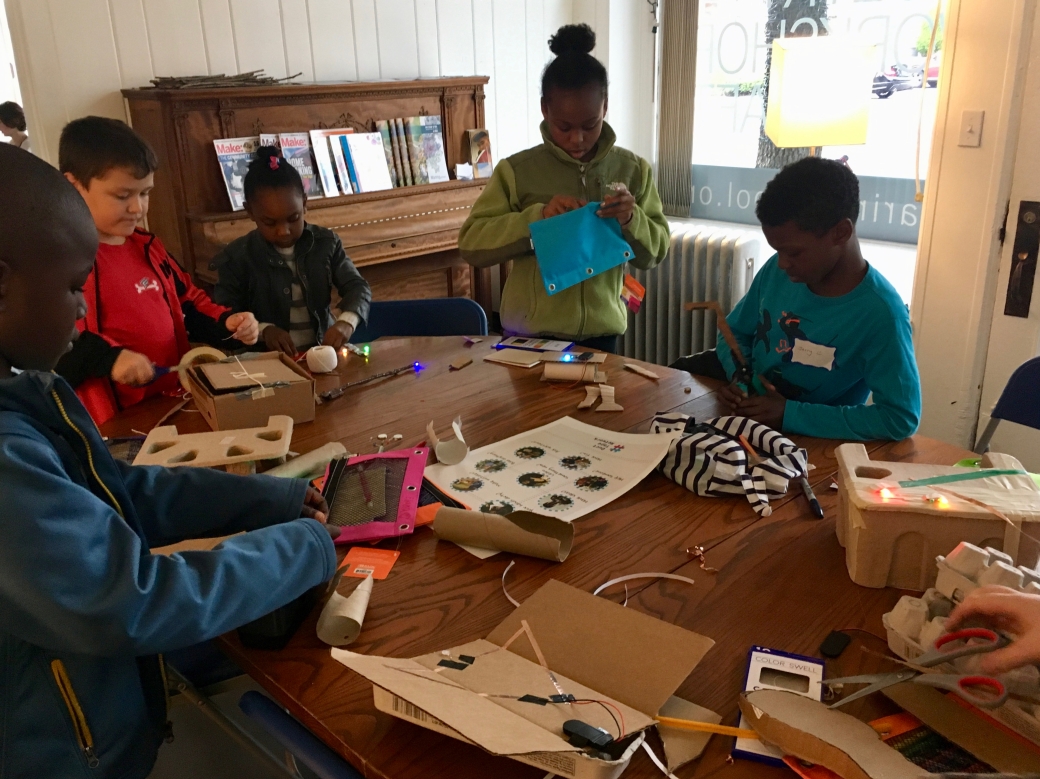
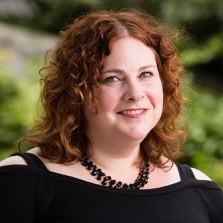 While home in Providence for Rosh Hashanah, I saw an elderly family friend in temple who asked me what I was working on. I told her that we were currently rehearsing Radium Girls, and when I started to tell her about it, she nodded and looked at me intently. Then she teared up. She knew the story, and not because she’d Googled “large cast plays for high school students.”
While home in Providence for Rosh Hashanah, I saw an elderly family friend in temple who asked me what I was working on. I told her that we were currently rehearsing Radium Girls, and when I started to tell her about it, she nodded and looked at me intently. Then she teared up. She knew the story, and not because she’d Googled “large cast plays for high school students.”
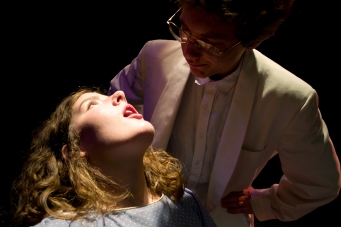 implications which prevent them from playing the visceral heart of their story. I began to fear that our students would collapse under the weight of their responsibility to the history, and that the play would become preachy and heavy-handed. Then I remembered what my thesis advisor told me when I was writing a play about a daughter making a last-ditch effort to forge peace with her mother, who was dying of leukemia. “Don’t play the illness, he cautioned me, “play the moment.” I knew that was what we would need to do here. We would play the moment when Irene’s mouth starts to bleed, heralding her demise. We would play the moment when the factory president must confront his culpability in the poisonings and his inability to forgive himself. We would play the moment when Grace breaks her engagement because she knows she won’t live long enough to see her wedding day.
implications which prevent them from playing the visceral heart of their story. I began to fear that our students would collapse under the weight of their responsibility to the history, and that the play would become preachy and heavy-handed. Then I remembered what my thesis advisor told me when I was writing a play about a daughter making a last-ditch effort to forge peace with her mother, who was dying of leukemia. “Don’t play the illness, he cautioned me, “play the moment.” I knew that was what we would need to do here. We would play the moment when Irene’s mouth starts to bleed, heralding her demise. We would play the moment when the factory president must confront his culpability in the poisonings and his inability to forgive himself. We would play the moment when Grace breaks her engagement because she knows she won’t live long enough to see her wedding day.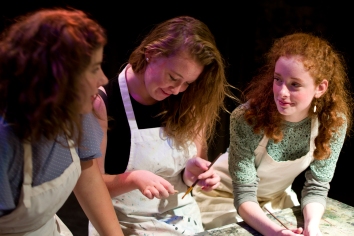 Ainsley play Gus, a teenage boy who does not speak? How will Emma play Libby, a woman who survives a catastrophic fall? We answer these questions using other questions to guide us. We ask what our characters want, from whom they want it, and how they will get it. We ask about the dire consequences of not fulfilling our characters’ objectives. When we warm up, I tell my actors to plant these objectives in their bodies, to let these desires drive them down the paths their characters travel.
Ainsley play Gus, a teenage boy who does not speak? How will Emma play Libby, a woman who survives a catastrophic fall? We answer these questions using other questions to guide us. We ask what our characters want, from whom they want it, and how they will get it. We ask about the dire consequences of not fulfilling our characters’ objectives. When we warm up, I tell my actors to plant these objectives in their bodies, to let these desires drive them down the paths their characters travel.